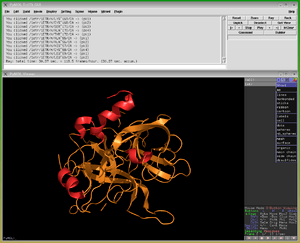PyMOL
 | |
 A PyMOL instance, with the Viewer and GUI visible. | |
| Original author(s) | Warren Lyford DeLano |
|---|---|
| Developer(s) | Schrödinger, Inc. |
| Initial release | 2000 |
| Stable release |
2.2.0
/ 24 July 2018 |
| Written in | C, C++, Python |
| Operating system | Cross-platform: macOS, Unix, Linux, Windows |
| Platform | IA-32, x86-64 |
| Available in | English |
| Type | Molecular modelling |
| License | Python[1] |
| Website |
www |
PyMOL is computer software, a molecular visualization system created by Warren Lyford DeLano. It is user-sponsored, open-source software, released under the Python License. It was commercialized initially by DeLano Scientific LLC, which was a private software company dedicated to creating useful tools that become universally accessible to scientific and educational communities. It is currently commercialized by Schrödinger, Inc. PyMOL can produce high-quality 3D images of small molecules and biological macromolecules, such as proteins. According to the original author, by 2009, almost a quarter of all published images of 3D protein structures in the scientific literature were made using PyMOL.
PyMOL is one of a few open-source model visualization tools available for use in structural biology. The Py part of the software's name refers to that it extends, and is extensible by, the programming language Python.
PyMOL uses OpenGL Extension Wrangler Library (GLEW) and FreeGLUT, and can solve Poisson–Boltzmann equations using the Adaptive Poisson Boltzmann Solver.[2] PyMOL used Tk for the GUI widgets and had native Aqua binaries for macOS through Schrödinger, which were replaced with a PyQt user interface on all platforms with the release of version 2.0.[3]
Nonfree binaries
On 1 August 2006, DeLano Scientific adopted a controlled-access download system for precompiled PyMOL builds (including betas) distributed by the company. Access to these executables is now limited to registered users who are paying customers; educational builds are available free to students and teachers. However, most of the current source code continues to be available for free, as are older precompiled builds. While the build systems for other platforms are open, the Windows API (WinAPI, Win32) build system is not, although unofficial Windows binaries are available online.[4] Anyone can either compile an executable from the source code or pay for a subscription to support services to obtain access to precompiled executables.
Acquisition by Schrödinger
On 8 January 2010, Schrödinger, Inc. reached an agreement to acquire PyMOL. The firm assumed development, maintenance, support, and sales of PyMOL, including all then-valid subscriptions. They also continue to actively support the PyMOL open-source community.
Gallery
 The same protein structure (TEV protease - PDB: 1LVB) rendered in different modes. Standard cartoon, surface, cut-through of surface, highlighted barrels, 'QuteMol'-like, 'Goodsell'-like, glossy-surface, and b-factor putty.
The same protein structure (TEV protease - PDB: 1LVB) rendered in different modes. Standard cartoon, surface, cut-through of surface, highlighted barrels, 'QuteMol'-like, 'Goodsell'-like, glossy-surface, and b-factor putty.
See also
References
External links
| Wikimedia Commons has media related to PyMOL. |
- Official website
- PyMOL Wiki
- Read-only PyMOL Wiki Mirror
- Schrödinger LLC
- Molecular movie-making with PyMOL